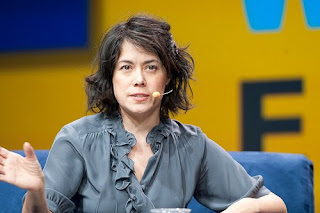
Getting discouraged by the slumping economy and a lack of money to start the social enterprise of your dreams? Don’t despair, says Caterina Fake, the businesswoman, angel investor and entrepreneur who co-founded Flickr, sold it to Yahoo! and ran the Technology Development Group there. At the recent Web 2.0 Expo in New York, Fake shared some of her early startup experiences and gave assurance to attendees – mostly startup owners and entrepreneurs like herself.
“We had no money – no cash when we started up Flickr” in 2002, Fake told attendees. “We started the company to build a video game but it ultimately failed and we ran out of money so we were running on fumes when we came up with the idea of Flickr. Talk about resource-constrained! We really and truly had no money – about three months of gas left in the tank, and none of us were taking salaries. Ninety percent of the features you see on Flickr were built with a team of six people. We were based up in Vancounver at the time, but even though we were highly under-resourced, those constraints were the things that made us more creative. We had to do creative things to get the word out about Flickr. It seemed counterintuitive at the time to be able to post your photos on your blog or on other parts of the Web but we saw that bandwidth constraints were rapidly declining.
“…We thought up stunts to recruit people and get publicity on BoingBoing, which we may not have done if we had money to hire a proper VP of marketing,” she told attendees. “And the design of the site at the time was seen as very minimalist.”
But Fake said small is good. “You can accomplish a great deal with a very small team,” she said. When Flicker was acquired by Yahoo! in 2005, it was an 11-person team, which moved to Sunnyvale and got absorbed a much larger company. “It was a bit of culture shock,” she recalls, “but the basic principles of innovation in a big company are the same as they are on the outside. You need to be agile, you need to be able to get obstacles out of the way, you need to be able to fund things quickly, to take risks, to allow experiments to fail and to allow things to grow for a sufficiently long time to see if they bear fruit.”
Fake is undaunted by the credit crunch, saying she thinks it is a “great time to start up a company.” A few years ago, she said, “I was seeing so many ‘me too’ companies, especially in Silicon Valley, which were rehashing the same ideas, with people not really doing anything novel or adventuresome or new or taking risks,” Fake said. “There was too much money and not enough creativity, so I saw that time as a bad time to do a startup. But times have changed. Everybody is tightening their belts, you need to be more creative, there isn’t much money. We started Flickr in 2002, which was a time, as you may recall, when everyone was saying the consumer market was dead. But looking back, that crunch time was when a lot of great startups got going. I think 2010 is also a great vintage year, a great time to start a company because it’s got a lot of the same things going for it – lots of talent to be had out there, not a lot of money to get people sidetracked or unfocused, and a creative environment that is incredibly rich right now.”
And New York, she says, is especially fertile ground for creative ventures. “One of my clear beliefs is that creativity really emerges from disparate elements coming together, different schools of thought, and the act of exposing yourself to different ideas,” she said. “You don’t find a better place than New York for that to happen. I love Silicon Valley but I do think there can be a bit of … an enclosed way of thinking there. The special sauce is New York culture; it’s also a media town with a very strong arts community, so I think it’s a very good petrie dish of different kinds of ideas.”
To see Fake’s full presentation at Web 2.0 Expo, click here for the video.
Fake currently serves as Chief Product Officer at Hunch, a new startup which launched publicly in June. Hunch is a decision engine that attempts to help people make a decision through a question-and-answer interface online. Fake also is a board member and investor at Etsy.com.




























No comments:
Post a Comment